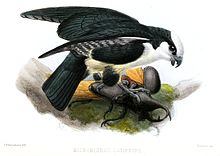| White-fronted falconet | |
|---|---|

| |
| Scientific classification | |
| Domain: | Eukaryota |
| Kingdom: | Animalia |
| Phylum: | Chordata |
| Class: | Aves |
| Order: | Falconiformes |
| Family: | Falconidae |
| Genus: | Microhierax |
| Species: | M. latifrons
|
| Binomial name | |
| Microhierax latifrons Sharpe, 1879
| |

| |
The white-fronted falconet (Microhierax latifrons), also called the Bornean falconet,[3] is a species of bird of prey in the family Falconidae. Described by the British ornithologist Richard Bowdler Sharpe in 1879, it is endemic to Borneo, where it is found in Sarawak, Sabah, and extreme northeastern Kalimantan. An extremely small falcon, it is only 14–17 cm (5.5–6.7 in) long and weighs 35–65 g (1.2–2.3 oz), being the smallest species of falconet. It has glossy bluish-black upperparts, black flanks and outer thighs, and a black mask. The belly and vent are pale yellowish-brown, while the throat, cheeks, and breast are white. The species can be told apart from other falconets by the colour of its crown and forehead, which is white in males and reddish-brown in females. It has no subspecies.
The species inhabits open forests, forest edges, clearings with dead trees, and cultivated regions with interspersed trees, and rarely in mangrove forests. It mainly eats insects, although it has also been reported hunting birds. The breeding season lasts from March to either June or April, with clutches of two eggs being laid in old barbet or woodpecker nest holes. It is classified as being near threatened by the International Union for Conservation of Nature and is also listed on Appendix II of CITES. Threats to the species include deforestation, forest fires, and the cage-bird trade.
- ^ BirdLife International (2021). "Microhierax latifrons". IUCN Red List of Threatened Species. 2021: e.T22696330A177572288. doi:10.2305/IUCN.UK.2021-3.RLTS.T22696330A177572288.en. Retrieved 14 February 2022.
- ^ "Appendices | CITES". cites.org. Retrieved 14 February 2022.
- ^ Cite error: The named reference
:3was invoked but never defined (see the help page).
